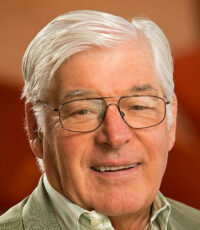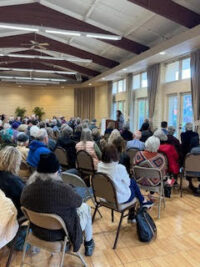Gas prices up in Sonoma, too

The long-dreaded national gasoline hike hit Sonoma Valley last week – and even the retailers were unhappy.
By Friday, a gallon of regular gasoline was still a bit under the $4 mark at eight stations in and around Sonoma. Seven of them were offering high-grade gasoline at $4 a gallon or more: $4.15 at the Union 76 on Broadway, $4.07 at The Corner Station at Arnold Drive and Grove Street; $4.06 at the Union 76 on Hwy. 12; $4.03 each at the Union 76 and Chevron stations on West Napa Street; $4.01 at Valero on Hwy. 12; and $4.00 at Broadway Shell.
As a comparison, according to data from the California Energy Commission, the 1974 oil shortage spiked California prices to a then-unheard of 52 cents a gallon – or more than $1.80 in 2008 dollars.
Statewide, the average price for premium gasoline was $3.98 a gallon as of Monday, April 14, according to the US Dept. of Energy. Standard was $3.84 a gallon. The national retail price of gasoline has been wobbling near $3 a gallon since last autumn, and Bill Bush, spokesman for the Washington, D.C.-based American Petroleum Institute, said Monday that crude-oil costs are the major factor. State and federal taxes (at a per-gallon average of 46 cents) add the next biggest component, with transportation costs – pipeline vs. ship or tanker – providing another.
The oil companies themselves set the retail price, leaving station owners a margin of 3 to 30 cents a gallon to adjust based on local conditions including competition and sales volume. According to a survey of Sonoma station owners who preferred not to be directly quoted, that usually means they reap a per-gallon profit of 20 cents regardless of the at-pump price.
One owner said he’d rather the price go back to $2 a gallon so the sales tax would be lower. Another said that when gas prices go up, more people use credit cards – which means added processing costs.
Sonoma resident Bob Heideman, filling his tank on West Napa St. Friday morning, sounded a philosophical note. “It is what it is, and there’s nothing we can do about it,” Heideman said. “But it’s not as high as San Francisco, so what can you do?”
Council tackles nonprofit funding
After years of wrangling over how and whether Sonoma should fund local nonprofits, the City Council Wednesday night agreed to try settling the matter once and for all.
Mayor Joanne Sanders and Mayor Pro Tem Ken Brown will head an ad-hoc committee composed of city staff and representatives from affected community groups to develop what Sanders called a “long-term, strategic plan.” The committee is expected to report its findings at the council’s May 21 meeting.
Sonoma is currently on a two-year budget plan, and tight finances have meant that local non-profits will receive no city funding in fiscal 2008-2009. The council last year adopted a “two-tier” system, with the Vintage House Senior Center, Boys and Girls Club Valley of the Moon and Sonoma Ecology Center in the first tier and seventeen others in the second. The organizations funded provide many community services that might otherwise be handled by a municipal parks and recreation department.
Green Business Certificates for eight Valley businesses
On Tuesday, April 22, the Sonoma County Board of Supervisors recognized eight Sonoma businesses for their efforts toward sustainability and awarded them their Bay Area Green Business certificates. The eight are:
Baksheesh, Sonoma; Benziger Family Winery; Diageo Carneros Bottling and Distribution Center, Sonoma; Imagery Estate Winery, Glen Ellen; MacArthur Place, Sonoma; Saddles Restaurant, Sonoma; Moon Mountain Winery, Sonoma.
Exchange Bank in Sonoma, along with its other 15 locations, also got its Green Business certificate. For more information, contact Laurie Decker, Economic Development Program Manager, at 707.327.7338.
City announces loans for energy efficiency
On April 16, 2008, the City of Sonoma’s Community Development Agency (CDA) approved a new loan program to provide financial assistance to businesses that wish to install energy efficiency upgrades, including but not limited to photo voltaic installations for electricity generation (solar power).
To promote this program, the city is working with PG&E and its energy efficiency partners including the Small Business Energy Alliance (SBEA), an energy services firm that subsidizes lighting retrofits and air conditioning tune-ups for small businesses throughout Northern California. The program is an expansion of the CDA’s existing commercial rehabilitation loan program to include energy efficiency and solar energy projects. Its goal is to accelerate the rate of implementation of major energy efficiency measures and alternative energy sources, and assist with the reduction of utility costs for commercial buildings.
Commercial properties in the city’s redevelopment project area will be able to apply for funding assistance to effect energy efficiency upgrades, including but not limited to energy efficient windows and insulation, installation of energy efficient heating and ventilation systems, and installation of photo voltaic systems for solar energy generation. Equipment that does not qualify as fixtures (e.g. commercial appliances, computers, etc.) would not be eligible for the program.
Eligible upgrades must result in a reduction in ongoing utility costs and reduce electrical, natural gas, and/or other energy usage. Priority will be given to applicants who provide a certain contribution to their proposed energy efficiency and/or solar project (e.g., 50 percent match). Loan amounts may be up to $50,000. Further specific program details are still being formulated.
For information regarding the new CDA energy efficiency upgrade and solar loan program, contact Laurie Decker, Economic Development Program Manager, at 707.327.7338 or Linda Kelly, City Manager, at 707.933.2215.?
Artisan Bakers not short of bread
A sign on their West Napa Street store indicating reduced hours to cut costs does not, according to general manager, Don Helton, mean Artisan is short of wheat or affected any more than all the rest of the bakers and consumers of grains in the current market crisis. “We’ve expanded,” he said, noting that they’ve taken on larger production space in the industrial park on Eighth Street East. He said the current pressures related to rising costs of fuel and grains as a result of farmers planting corn for fuel instead of food is causing them and all others to increase prices – a trend he hopes will ease and not increase.
Ecology Center to survey Bond house

The difference between a park and a white elephant was taken up last week by the Sonoma City Council – and may be decided in part by the Sonoma Ecology Center.?“The city gets gifts, and as bizarre as it sounds we can’t afford them,” said Mayor Joanne Sanders.?At issue was the six-acre Seventh Street East parcel known officially as the Bond Property and affectionately as the Sonoma Garden Park. Bequeathed to the city in 1977 by Pauline Bond on the condition that the property remain a public park, the land contains a 1920s-era house and detached garage. Since 1993, the property, now an educational garden, has been leased to the Sonoma Ecology Center for $1 per year.?City employee Dave Chavoya rented the house for the past 30 years. He recently moved out, and a subsequent survey by the city’s Building Official said the house should remain unoccupied until the usual old-home problems – dry rot, cracked foundation, and mold – could be dealt with.?The council discussed various options – raze or rehabilitate the home, or sell it after subdividing the property. City Attorney Tom Curry pointed out that Bond’s will may make the latter difficult.?“The conditions on the gift have to be addressed – we can’t ignore them,” Curry said. “They could renovate the house, but it could not be a private residence.”?The Sonoma Ecology Center has long had an interest in renovating the house and making it an official part of the Garden Park. “We really need to know a lot before we can do anything, and we’re hoping this is an opening conversation,” said center director Richard Dale.?After some further discussion, the council unanimously passed councilmember Steve Barbose’s motion to have a volunteer contractor from the Ecology Center conduct a full assessment and report back to the council at a future meeting.?






